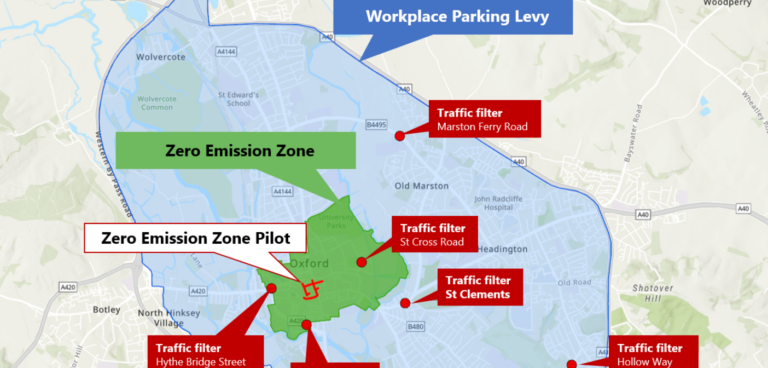Plans to create a sustainable and reliable transport system in Oxford have been announced.
The proposals will see the introduction of a city-wide workplace parking levy, traffic filters and a wider zero-emission zone, together with improved public transport and cycle routes.
Over the coming months, Oxfordshire County Council and Oxford City Council will engage with businesses, service providers, hospitals, transport providers, schools and town and parish councils to gather suggestions and feedback on the proposed schemes.
Consultations on these proposals will take place in late summer 2022, with the schemes to be implemented between 2023 and 2024. The plans will support people to walk, cycle and make faster journeys by public transport, as well as to reduce air pollution, create healthy communities and reduce traffic levels across the city.
The new proposals include:
- Workplace parking levy (WPL): The councils are proposing to extend the WPL to cover employers across the city. By law, money raised by the levy must be spent on improving transport in the city.
- Traffic filters: Six traffic filters are proposed on certain roads to reduce traffic congestion, improve bus journey times and create safer routes for cyclists and pedestrians.
- Zero Emission Zone (ZEZ): The councils propose to extend the ZEZ from the current pilot area to cover the entire city centre.
According to Oxfordshire County Council, transport emissions currently account for 17% of greenhouse gas emissions in Oxford. To achieve a zero carbon transport network in the city by 2040, a 30% reduction in the use of vehicular transport through increases in cycling, walking, home-working, car sharing and car clubbing is needed.
Councillor Tom Hayes, deputy leader and cabinet member for green transport and Zero Carbon Oxford, Oxford City Council, said: “Gridlocked traffic is bad for everyone – it is bad for residents, bad for the economy, and bad for the environment.
“That’s why we’re expanding the planned workplace parking levy across the city and the zero-emission zone to the whole city centre, as the city council has long called for.
“In closer partnership, both councils are throwing their weight behind our critically important bus network. We must back Oxford’s buses to recover from the pandemic and move around the city without significant delays, and that must take place immediately and, with these plans, over the medium-term.”
Initial engagement on a WPL and traffic filters took place in 2019. Consultations on temporary city centre bus gates took place in 2020. Since then, the two councils have been working together to enhance these proposals drawing on feedback from over 10,000 residents, businesses and community groups.
Funding for these schemes will come from various sources. The county council is actively applying for grants from the UK government such as the zero-emission transport cities bid. It is also currently awaiting the outcome of its Bus Service Improvement Plan submission, as well as a bid to the government’s Zero Emission Bus Regional Areas scheme for funding to support the delivery of more than 150 new electric buses in Oxford.





